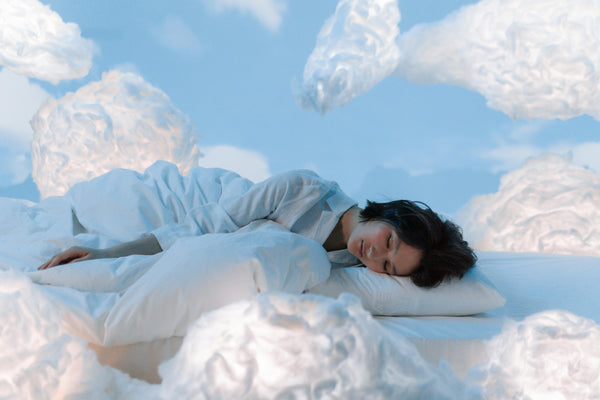
Women Need More Sleep Than Men, It's A Fact!
The recommended amount of sleep the average adult should aim to get is between 7–9 hours per night, but have you wondered if women need more sleep than men? The answer is YES!
_____________________________________________________________________________________________
How Much Sleep Do Women Need Compared To Men?😴
When it comes to sleep health, every single minute counts. While most adults need 7–9 hours of sleep per night, individual sleep needs vary. However, studies show that women typically need 10–20 minutes more sleep than men.
You might think that an extra 20 minutes per night isn’t going to make much of a difference. But, consistently skipping out on sleep—whether it’s for late-night Netflix binges 📺 or scrolling through your phone 📱—can take a serious toll on energy levels, focus, and overall well-being.
Why Do Women Need More Sleep?
Typically, women often experience more sleep related issues than men due to hormonal fluctuations, sleep disorders (insomnia, sleep apnea, restless legs etc) and mental health conditions like depression and anxiety.
Hormone Fluctuations 😵💫
Our circadian rhythm plays a major role in balancing hormones. If our sleep cycle is disrupted, it can throw off hormone levels and increase risk of sleep disturbances.
Women experience frequent hormonal changes throughout their lifespan including menstrual cycles 🩸, pregnancy, breastfeeding 🍼, peri-menopause and menopause 🥵.
If you're not on top of your hormones, it can seriously impact sleep quality, especially during your period, when discomfort and worry about leaks can keep you tossing and turning.
One way to set yourself up for better sleep is to prioritize comfort and protection for leak-free rest. 💤
Cottons Organic Overnight Pads are specially designed for nighttime use, with extra length and coverage for maximum protection. Made from 100% organic cotton, they’re perfect for sensitive skin and give you the confidence to sleep like a log! They even won Best Overnight Pads in 2020! 🏆 
If it takes longer for you to fall asleep, it reduces the amount of time in deep and REM sleep which can potentially increase the likelihood of developing sleep disorders and chronic health conditions like thyroid disease.
Depression & Anxiety
Sleep and mental health are essentially brother and sister – they are very closely related to one another. Poor sleep can worsen mental health, while depression and anxiety can cause sleep troubles. Unfortunately, women are twice as likely to experience anxiety or depression compared to men.
The impact mental health can have on sleep is genuinely shocking:
○ People with depression are 80% more likely to experience insomnia 🛌
○ 20% of people with depression have sleep apnea 😫
○ 15% experience hyper insomnia (excessive sleepiness or oversleeping) 😪
If you struggle with sleep due to anxiety or depression, addressing mental health issues with tools like therapy or simple lifestyle adjustments can make a massive difference!
Increase Risk of Sleep Disorders ⚠️
Women don't have the luck of the draw when it comes to the likelihood of developing sleep disorders 🎲. Conditions like restless leg syndrome are twice as common in women than in men.
While men have higher rates of sleep apnea, the gap closes once women reach menopause.
The bigger problem here is that sleep apnea symptoms in women are less obvious, leading to under-diagnosis and untreated sleep issues.
Are You Getting Enough Sleep? 💤
Regardless if you're male or female, the fact is that in general, we're not getting enough sleep.
The best way to determine if you're well rested is to assess how you feel a few hours after you wake up.
You can ask yourself:
○ How are my energy levels? ⚡
○ Am I able to focus on my tasks? 🎯
○ Am I emotionally regulating myself? 😊
It's normal to start to feel tired in the early afternoon, so make sure you assess yourself not too late in the day.

Tips For Improving Sleep Quality
In order to get the most out of your sleep, you can try to:
○ Avoid caffeine in the afternoon ☕
○ Avoid alcohol 🍷 (it helps you fall asleep, but not stay asleep)
○ Establish a sleep routine (yellow lights/mood lighting, hot shower 🚿, no devices in bed etc)
○ Wake up at the same time every day ⏰ (yes, that includes weekends!)
○ Have a quick power nap or do a 10 minute yoga nidra for an energy boost in the afternoon 🧘♀️
○ Get morning sunlight ☀️ and watch the sunset (this helps regulate your circadian rhythm)
○ Daily exercise 🏋️♀️
_____________________________________________________________________________________________
If you’re still feeling groggy despite these changes, consider seeing a doctor or sleep specialist to identify potential underlying issues. Quality sleep is vital for overall health, so prioritizing rest is one of the best things you can do for yourself! 💖
For more information on sleep health, check out the 🌐 Sleep Foundation.

